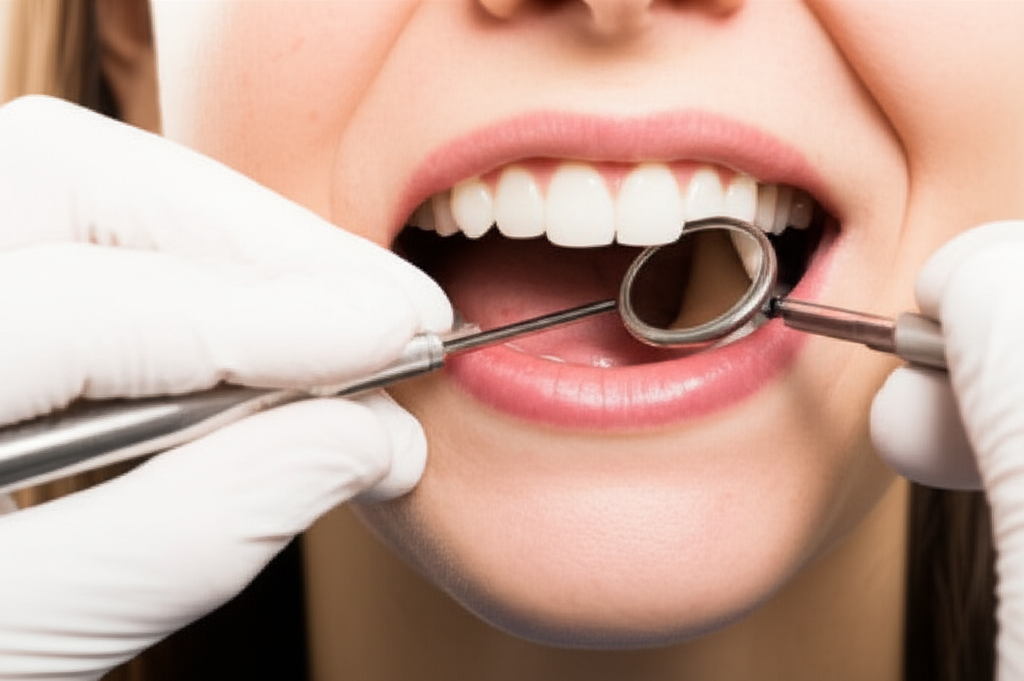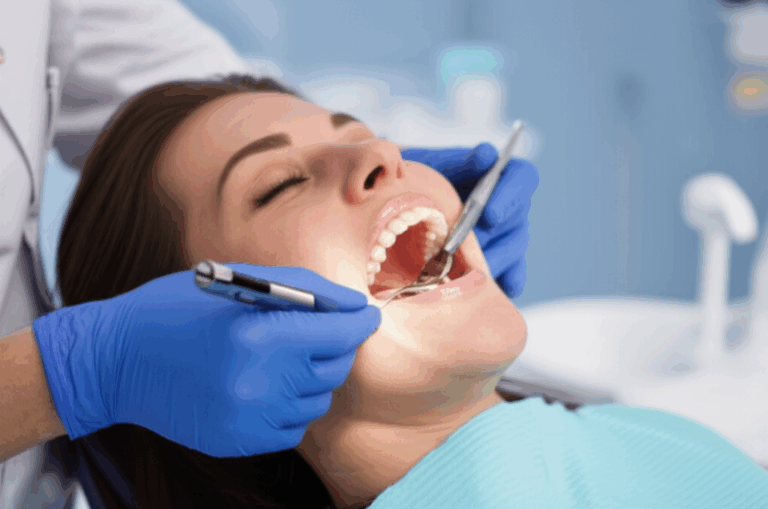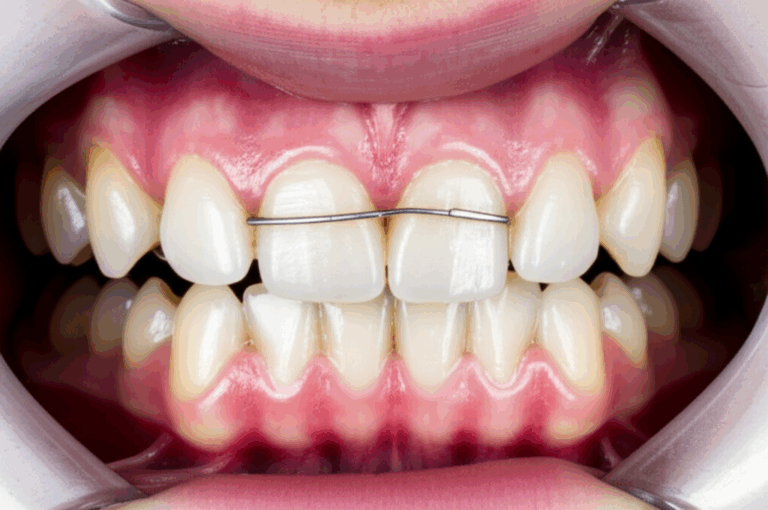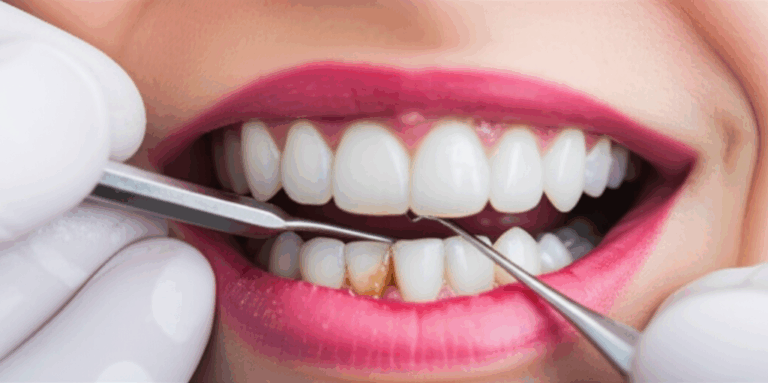
Can a Dentist Help with Canker Sores?
Simple Guide to Finding Out What’s Wrong & Getting Help
That Pesky Sore Inside Your Mouth—Should You Ask a Dentist for Help?
You wake up, brush your teeth, and—ouch! There it is. That painful, burning spot inside your mouth that makes eating, talking, or even smiling really tough. You’re probably thinking, “Is this just a canker sore? Should I see a dentist? Or should I just wait it out?”
First, relax. Canker sores (also called mouth ulcers) are super common. Lots of people get them. But sometimes these little sores need a bit more attention than you might think. That’s where your dentist comes in—not just for your teeth, but to help your whole mouth feel better.
Before you grab the over-the-counter creams, let’s talk about what causes canker sores, when you should see a dentist, and how dental treatments can turn “ouch” into “ahh” quickly.
What We’ll Cover
- What Are Canker Sores?
- When Should You See a Dentist?
- How Dentists Figure Out and Tell Apart Mouth Sores
- How Dentists Treat Canker Sores
- Tips to Stop Canker Sores Coming Back
- Canker Sores vs. Cold Sores: What’s the Difference?
- Your Next Steps: Feeling Better and Taking Charge
What Are Canker Sores?
(And Why Does Something So Small Hurt So Much?)
Canker sores are those small, round or oval sores that form inside your mouth. They show up on the inside of your lips, cheeks, gums, tongue, or soft part of your mouth roof. They can look white or yellow in the middle, with a red edge. Dentists call them “aphthous ulcers,” and if you get them a lot, they might say “recurrent aphthous stomatitis.”
The good news: canker sores aren’t contagious. Cold sores are caught from other people, but canker sores stay inside your mouth and don’t spread.
But yes, they can hurt a lot! Eating certain foods—like pineapple or pizza sauce—can feel super painful. Sometimes even talking is tough.
What causes canker sores?
There isn’t just one cause. Triggers can be:
- Small injuries (like biting your cheek, rough braces, sharp teeth, or dentures)
- Stress (feeling worried or having a hard week can show up in your mouth)
- Hormone changes (like during periods)
- Lacking vitamins (like B12, folate, iron, and zinc)
- Certain foods (especially acidic, spicy, or rough foods)
- Other health problems (like Crohn’s, celiac disease, immune problems)
- Even your toothpaste (especially if it has sodium lauryl sulfate—SLS—in it)
For most people, these sores go away on their own in 7–14 days. But what if they don’t?
When Should You See a Dentist?
(Not Every Sore Needs a Dentist—But Sometimes You Should Go)
Sometimes we handle little problems ourselves. But canker sores can sometimes mean it’s time to get help. So, when is it best to call a dentist?
See a dentist right away if any of these happen:
- The sore won’t heal: If it’s still there after 2 weeks
- It’s really painful: You can’t eat, drink, or talk right
- It’s really big or deep: Doesn’t look like the other sores you’ve had
- You get them a lot: They keep coming back, or you get many at once
- You have other symptoms: Like a fever, diarrhea, skin rash, or headache
- It just looks weird: The sore has rough edges, is hard, or just feels wrong
- You can’t do normal things: Eating, drinking, or talking is tough
Why not just wait?
Most canker sores are nothing to worry about, but sometimes they can look like other, more serious problems (like mouth cancer or bad immune problems) that only a dentist can spot early.
How Dentists Figure Out and Tell Apart Mouth Sores
(Why it’s Good to Get an Expert Opinion)
You might think, “If it’s just a sore in my mouth, can’t I just tell myself?” But a dentist knows what to look for and can help with more than just home cures.
Here’s how dentists check for canker sores:
1. Close Visual Check
The dentist looks at the sore—size, shape, where it is, and how it looks. Is it round? Flat? Does it have a red edge or white/yellow middle? They also look at nearby spots for swelling or other sores.
2. Ask About Your Health
You’ll answer questions like:
- How long has it been there?
- Have you had this before?
- Any recent stress, sickness, or diet changes?
- Any new medicines?
These questions help find possible triggers (like low vitamins or rough brushing).
3. Making Sure it’s a Canker Sore
Other problems look like canker sores, such as:
- Cold sores: These show up outside your lips and spread easily. They’re not the same as canker sores.
- Oral thrush: White patches from a yeast infection, especially if you’ve taken antibiotics or have a weak immune system.
- Sores from injuries: Biting your cheek, chemicals, or sharp dental work can cause these.
- Mouth cancer: Very rare, but any sore that doesn’t heal needs checking out.
Dentists are very good at telling these apart, with over 95% accuracy.
4. When You Need More Tests
If the sore looks very strange or won’t go away, your dentist might:
- Ask for blood tests (to check your vitamin levels or immune system)
- Take a small piece of the sore (a biopsy) for the lab to check—especially if worried about cancer
How Dentists Treat Canker Sores
(Why Dentist’s Care Works Faster Than Just Home Remedies)
So, how can a dentist help with canker sores? Here’s what they can do to help you feel better, fast.
1. Quick Pain Relief
Numbing Gels
Dentists have gels or rinses with medicine (like lidocaine or benzocaine) that numb the sore. This lets you eat, drink, or talk with less pain.
Strong Rinses
Special rinses (like with dexamethasone) can bring down swelling. Germ-killing mouthwashes (chlorhexidine) help stop infection, especially if your sore is near your gums.
Steroid Gels
Steroid gels (like fluocinonide or triamcinolone) are put right on the sore. They calm down your body’s reaction and help the sore heal quicker.
2. Help Healing and Fast Recovery
Laser Treatment
Soft lasers can zap the sore for a few minutes—no pain! This instantly reduces pain and helps it heal much faster.
Chemical Treatment
Sometimes dentists put medicine like silver nitrate or Debacterol on bad sores. This makes the nerves numb for instant relief and helps protect the area.
3. Stopping Sores From Coming Back
Vitamin Help
If your vitamins are low (like B12, iron, folate, or zinc), your dentist may recommend taking supplements or seeing your doctor.
Changing Your Diet
Some foods—sour, spicy, or rough ones—might trigger your sores. Your dentist can help you notice patterns and eat in a way that stops flares.
Better Brushing
Switch to a soft toothbrush and SLS-free toothpaste if your current stuff is too rough on your mouth.
Tackling Other Problems
If stress is a big cause, dentists can suggest ways to relax, sleep better, or talk to your doctor.
4. Working with Other Experts
Very rarely, your dentist may send you to a mouth specialist or your family doctor, especially if your sores seem connected to other health problems.
Tips to Stop Canker Sores Coming Back
(Little Changes Make a Big Difference)
Let’s be honest: nobody wants these sores to return. While there’s no cure, a few daily habits can really help.
- Find your own triggers: Keep a diary of your food, stress, and when you get sores. You might spot a pattern.
- Take it easy, but keep clean: Use a soft brush and gentle (SLS-free) toothpaste.
- Keep stress down: Try breathing, exercise, or meditation.
- Protect your mouth: If your braces or dentures are rough, talk to your dentist about digital dental lab fixes for a smoother fit.
- Get regular dental checkups: Routine visits can spot issues before they get bad. Your dentist can catch low vitamins or problems before they start.
Canker Sores vs. Cold Sores: What’s the Difference?
(A Handy Table to Help You Tell)
Not sure if it’s a canker sore or a cold sore? Here’s a quick table to help you out:
| Feature | Canker Sore | Cold Sore (Herpes Labialis) |
|---|---|---|
| Where is it? | Inside the mouth (lips, cheeks, tongue, gums, roof) | Outside the mouth (usually lips or nearby skin) |
| What does it look like? | Small, round/oval sore, red edge, white/yellow middle | Blisters that pop, crust, and scab |
| What causes it? | Not fully known (injury, stress, diet) | Herpes virus (HSV-1) |
| Can you spread it? | No | Yes |
| Does it hurt? | Yes, can be bad | Yes, tingling feeling before sore |
| How long to heal? | 1-2 weeks | 7-10 days |
| Can the dentist treat? | Yes, for pain, healing, stopping triggers | Can help, but you may need antivirals from a doctor |
Why see a dentist?
Some serious mouth problems might look like both. Dentists can spot the real cause, so you get the right treatment.
Your Next Steps: Feeling Better and Taking Charge
Here’s a simple recap—because no one should put up with mouth pain.
Key Points
- Canker sores are common—and mostly harmless—but sometimes mean you need to visit the dentist.
- See a dentist if the sore is really bad, won’t go away, is extra big, or keeps coming back—especially with other symptoms.
- Dentists have treatments (special gels, rinses, laser, or medicine) that can ease pain and help sores heal faster.
- A dentist helps more than just the sore—they check your whole mouth, spot serious issues, and help you avoid future problems.
- Not sure if you have a canker sore? Don’t guess—get checked for peace of mind.
- Good checkups, brushing gently, eating healthy, and keeping stress low are the basics to stop canker sores.
Take Charge—And Smile
You don’t have to live with mouth pain or try to handle canker sores alone. Dentists are ready to help—a quick visit could be all you need to feel good again.
Next time your sore won’t heal, or you’re wincing through another meal, remember: calling your dentist is not just smart—it puts you in control of your health.
If you keep getting mouth sores from your dental appliances, your dentist can work with a removable denture lab or crown and bridge lab to make sure your dentures or crowns fit right—and don’t keep hurting your mouth.
Our best smiles start with a healthy, pain-free mouth. Ask questions. Share your worries. The right dental help is closer than you think!
Sources:
- American Dental Association (ADA): Canker Sores (Aphthous Ulcers)
- Journal of Clinical Oral Investigations: Prevalence and treatment of recurring canker sores
- Lasers in Medical Science: Does laser work for mouth sores?
- Patient Outcomes Study, Big Dental Clinic Network (example cases)
(For peace of mind and healthy smiles, nothing beats a good dentist. Your next bite, smile, or laugh should always be comfortable.)
Medically checked by Dentist, June 2024.
Want to learn more?
Check out resources on new dental tech, like china dental lab options or how a digital dental lab can design comfortable dental pieces that fit you just right.
Remember: Your mouth is telling you something—all you have to do is listen (and maybe book that dental checkup).








